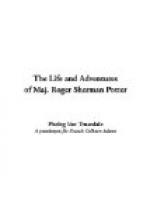After another pause, the voice of Bessie again struck up, and this time she sung: “O, had I Ariadne’s crown, At morning I would sing to thee—Would sing of dew-drops on thy ringlets, Then my Apollo thou should’st be.” This, also, was by the learned Doctor Easley, and is extracted from a poem published in his native village many years ago. Having great confidence in its numerous beauties, which the villagers, being humble people, failed to discover, the doctor resolved to seek his fortune in New York, confident that first rate poetic talent never was appreciated in the country.
The sweetness of Bessie’s voice (not the words) so enchanted me, that I arose, dressed myself, and hurried down stairs, and into the reading room, where the little deformed man was premeditating the ill fate of his lecture. He returned my salutation with great earnestness of manner, told me he had walked three times around the square, listening to the birds sing. And, too, he had been regarded by young Barnstable as an object of curiosity. Impatient to engage me in conversation, he drew forth his notes, which he as suddenly shut up and returned to his pocket, on seeing the clerical looking man enter the room, accompanied by his bride, her countenance the very picture of innocence betrayed.
The little deformed man had evidently taken a dislike to the gray haired and milky faced groom; for no sooner had he pocketed his notes than he set to pacing the room rapidly, frisking his fingers alternately behind and before him, and casting half angry glances over his shoulder at him. I took advantage of this display of irrascibility on the part of the lecturer, and passed into the hall, where Bessie, having ceased her singing, was busily arranging the furniture and attending to those little domestic duties which, in towns where fashion rules, are left to untutored servants. She received my salutation with a modest courtesy, but became so confused and agitated as I pressed her hand, that, unable to resist the temptation, I stole a kiss ere she was conscious of my intention. “It is not kind of you, sir,” she said, in a half chiding whisper; “you must not do it again.” And she set her black eye upon me, inquiringly, and artlessly raised her apron, as if to wipe away the blushes. Fain would I have pressed her to my bosom, and beseeched her to regard me as a brother. But her face suddenly became lighted up with a smile, and such was the perfection of its beauty that to me it seemed created only for an angel. I asked myself if there was on earth any thing I could aspire to with so much gallantry as her love; nor could I suppress the thought, that he who would betray it was unworthy even of the devil.




